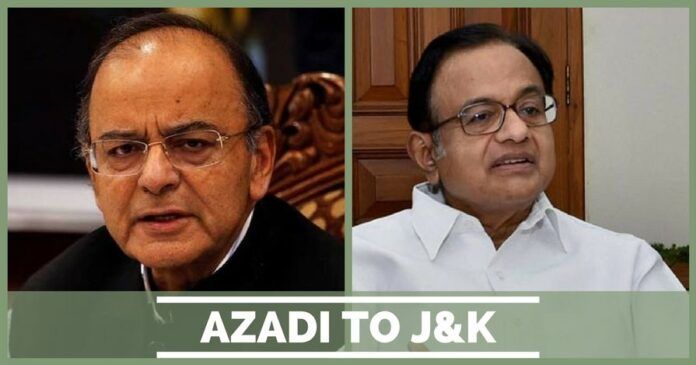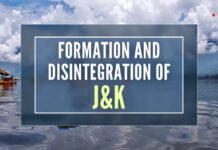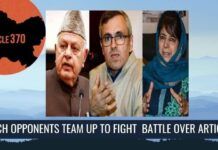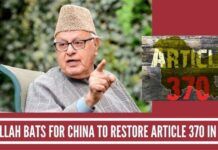
There is no difference in the approaches of the BJP and the Congress towards Muslims of Kashmir
Sonia Gandhi’s right-hand man and former Union Home and Finance Minister, controversial P Chidambaram, on October 28 sought Azadi for the people of Jammu & Kashmir. “The demand in the Kashmir Valley is to respect the letter and spirit of Article 370, that means they want greater autonomy. My interactions in Jammu & Kashmir led me to the conclusion that when they ask for Azadi, mostly, I am not saying all…the overwhelming majority, they want autonomy,” he told reporters in Gujarat’s Rajkot.
“Yes, I do,” Chidambaram said when was asked if he still thought that the militancy-hit Jammu and Kashmir should be given greater autonomy” (Indian Express, Oct 29).
There was nothing new in what Chidambaram said. He had been pitching for what he called a “unique solution” to the “unique” Kashmir problem since October 15, 2009. That day, he had said in Kashmir’s Srinagar that Kashmir had a unique history, unique geography and Kashmir was a unique problem which needed a unique solution. He had also said that the solutions which were applicable to other states of the Union could not be replicated in Kashmir.
Speaking at the All India Editors’ Conference, Chidambaram had declared that the Government will follow the policy of quiet diplomacy to find a solution to the problems in Jammu & Kashmir; that the talks will be held silently, away from the media glare; and that the Government of India was working on holding quiet talks with every section of opinion to find a unique solution to the problems of Jammu & Kashmir.
On April 16, 2017 that Chidambaram came out with a five-point Kashmir formula, an article he wrote for the Indian Express, titled “Across the aisle: Kashmir is sliding into disaster”.
“There will be political differences. There are different shades of opinion which could be described as extremist views. There would be some voices who are pleading for a separate nation. That is a reality, but whatever shade of opinion one has, there is no place for violence. Jammu & Kashmir has a unique geographical location and history. We have to find a solution that may turn out to be unique. The whole effort would be quiet until the contours of a political solution to the problems are found. This is essential to take the process forward. Once the broad contours of a political solution are arrived at, it will be made public at an appropriate time. We will find a solution that is honourable, equitable and acceptable to the vast majority; overwhelming majority, of the people of Jammu & Kashmir”.
Chidambaram had then stonewalled a question on whether the dialogue would include talks on the status of Jammu & Kashmir as an integral part of India, saying he will not get into verbal gymnastics. I will not like to get into these kinds of traps,” he had said (Indian Express, Oct 16, 2009).
However, it was on April 16, 2017, that Chidambaram came out with a five-point Kashmir formula. Actually, he wrote an article for the Indian Express, titled “Across the aisle: Kashmir is sliding into disaster”. In his article, he, inter-alia, wrote thus: “The writing on the wall is clear. The alienation of the people of the Kashmir Valley is nearly complete. We are on the brink of losing Kashmir. We cannot retrieve the situation through a ‘muscular’ policy — tough talk by ministers, dire warnings from the Army Chief, deploying more troops or killing more protesters”.
“If the current medicine of tough talk and tougher action has not worked in Jammu & Kashmir, why is it not opportune to try an alternative cure?”
“Jammu & Kashmir, then ruled by a king, acceded to India in 1947 under a ‘grand bargain’. Article 370 of the Constitution of India, adopted in 1950, embodied that grand bargain. Over the years, that Article has been honoured more in the breach than in the observance. The three regions of Jammu & Kashmir have responded in different ways. The centre of the conflict is the Kashmir Valley that is home to seven million people. The people of the Valley, especially the youth, have reacted aggressively to the denial of the autonomy that was promised when J&K acceded to India”
He said that to mark time would be lost Kashmir. It was “the last opportunity,” he said. He also said that though he felt that he would be labelled “anti-national”, still he would want the Narendra Modi Government to take at least five steps to retrieve the situation.
I quote verbatim what he wanted the Government of India to do:
1. Ask the PDP-BJP government to resign and promulgate Governor’s Rule. Mr N N Vohra has done a great job as governor, but it is time for a new governor.
2. Announce that the Central government will begin a dialogue with all the stakeholders. Talks can begin with civil society groups and student leaders. Eventually, talks must be held with the separatists.
3. Appoint interlocutors to pave the way for talks.
4. Reduce the presence of the Army and paramilitary forces and hand over the responsibility of maintaining law and order in the Kashmir Valley to the J&K police.
5. Defend the border with Pakistan by all means, take deterrent action against infiltrators on the border, but put on hold ‘counter-terrorist operations’ in the Valley.
And the operative part of his article read: “If the current medicine of tough talk and tougher action has not worked in Jammu & Kashmir, why is it not opportune to try an alternative cure?”
So, Chidambaram has been consistent since 2009. He has been pitching for the limited accession of Jammu & Kashmir with India to satisfy the communal and separatist urges of the Kashmiri Muslims, who have been ruling the state, exploiting Jammu and Ladakh and their natural resources and blackmailing and browbeating New Delhi. The sad truth is that Chidambaram’s support to the Islamo-fascists in Kashmir is full and unflinching.
It is amusing that a number of BJP ministers in the Narendra Modi Government pounced upon Chidambaram, who only said what March 1, 2015, PDP-BJP Agenda of Alliance says. Those who tore into Chidambaram included Arun Jaitley, Piyush Goel and Smriti Irani. Even Prime Minister Narendra Modi took on Chidambaram. Smriti Irani called the remark “shocking and shameful”. Arun Jaitley said that the Congress was “encouraging separatism in Jammu & Kashmir and that “Chidambaram’s statement ‘hurt’ India’s national interest which was a serious issue”. The Prime Minister said: “Congress leaders supporting those seeking ‘Azadi’ in Kashmir is an insult to our soldiers”.
The earlier NDA Government led by Shri Atal Bihari Vajpayee had initiated a dialogue process with all political groups, including the Hurriyat Conference, in the spirit of ‘Insaniyat, Kashmiriyat and Jamhooriyart’.
What did the PDP-BJP Agenda of Alliance say? It, among other things, said: “The Present position will be maintained on all the constitutional provisions pertaining to Jammu & Kashmir, including the special status in the Constitution of India…The earlier NDA Government led by Shri Atal Bihari Vajpayee had initiated a dialogue process with all political groups, including the Hurriyat Conference, in the spirit of ‘Insaniyat, Kashmiriyat and Jamhooriyart’. Following the same principles, the (PDP-BJP) coalition government will facilitate and help initiate a sustained and meaningful dialogue with all stakeholders, which will include all political groups, irrespective of their ideological views and predilections. This dialogue will seek to build a broad-based consensus on the resolution of all outstanding issues of Jammu & Kashmir…”
Even a superficial look at these lines will be enough to form a view that the Agenda of Alliance envisaged something more than Article 370 and that it gave virtually plenipotentiary powers to the state government to prepare the ground for the final resolution of the so-called Kashmir issue.
The fact of the matter is that both the Congress and the BJP are on the same page and that both do not consider Jammu & Kashmir an integral part of India to the same extent as other states of the Union. And the appointment of former IB Director Dineshwar Sharma as interlocutor for Jammu & Kashmir by the Narendra Modi Government further suggests that there is no difference whatsoever in the approaches of the BJP and the Congress towards Muslims of Kashmir. Both are Muslim-appeasers and both humiliate Jammu and Ladakh and the non-Muslim minorities in the state in a most brazen manner.
Note:
1. The views expressed here are those of the author and do not necessarily represent or reflect the views of PGurus.
- ‘Kashmir My core constituency’: Revisiting July 12, 2003 to understand politics, Omar Abdullah-style - March 15, 2024
- Total deviation from traditional approach: Seven takeaways from PM Modi’s March 7 Srinagar visit - March 9, 2024
- Status of political parties: Why is further J&K reorganization imperative? - March 1, 2024










